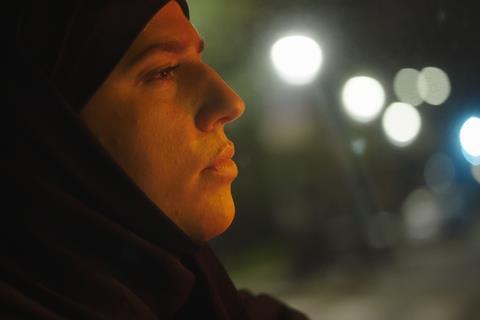Doc exploring French rap star Diam’s mental health and conversion to Islam is compromised by the involvement of its subject

Dirs/scrs: Mélanie Diam’s, Houda Benyamina, Anne Cissé. France. 2022. 79 mins
Only technically a pop star bio-doc, Salam tells the story of what happens when the music’s over – by the artist’s own decision. For some ten years, Mélanie Georgiades was a massively successful French rap star under the name Diam’s, with a devoted audience and a set of million-selling albums. But in 2011, she stopped performing and withdrew from the public eye. Co-authored by the artist herself, Salam explains why, covering Georgiades’ history of unhappiness and her eventual conversion to Islam. Fans hoping either for her music or for scabrous backstage revelations will be disappointed, as the film pointedly contains neither, but devotees will surely want to know what lies behind her decisive rejection of success and visibility.
By the end, the film has somewhat adopted the tone and the aesthetics of a religious pamphlet.
Georgiades comes across as an intriguing, complex, forceful personality, but the film is an awkward stylistic hodgepodge, and a fairly overt advertisement for the rewards of Islam. Filmic shortcomings and the fact that Diam’s is very much a Francophone phenomenon will definitely limit its exposure following its Cannes bow. As well as producing, Georgiades is credited as Salam’s co-director and co-writer alongside two female directors: Houda Benyamina, known for her breakthrough feature Divines and episodes of Damien Chazelle’s Paris-set Netflix series The Eddy, and Anne Cissé, whose work includes several shorts and scripts for hit series Lupin. It’s hard to get a clear sense of directorial coherence from a film that unevenly mixes its styles, but the consistent thread is the presence of Georgiades herself.
The Cyprus-born, Christian-raised artist became a huge rap star in France with albums including ’Brut de Femme’ and ’Dans ma Bulle’ but, we learn, didn’t find happiness. Prone to depression from her early teens, with a first suicide attempt at 14, she found an outlet for her discontent by rapping as Diam’s, and established her identity – as record producer Benjamin Ifrah notes - by totally taking control of her style and output. However, success and autonomy both took a heavy toll, as noted by those around her – including mother Dominique, manager Nicole Schluss, writer Faïza Guène and fellow musician Charlotte ‘Vitaa’. They attest to her violent shifts of mood and her tendency to self-harm, before they and Georgiades talk about her spell in a psychiatric clinic.
Just when Georgiades seemed to have hit rock bottom, she then explains, she discovered the Koran while on a trip to Mauritius with Vitaa, and everything changed. She subsequently converted to Islam, abandoned music and set up orphanage charity Big Up Project – in the process, attracting much hostility in the media and among her fans, after Paris-Match published a photo showing her fully veiled.
The only elements we see of Georgiades’ career as Diam’s are a brief sequence in which she is surrounded by her awards, and a revisit to a vast empty venue of the sort she once filled with fans. We don’t hear her music, or see images of her former self (we only ever see her today, in full niqab) but we do hear her occasional rap-style poetic monologues off-screen; she is also interviewed and seen talking to her mother.
The film makes an odd choice in the presentation of its interviews, showing only faces framed in deep black shadow, as if they themselves were veiled – something that might be seen as a decision arising from Islamic custom, although the presentation applies to the male interviewees too, including footballer Nicolas Anelka, a supporter of Diam’s’ charity, and musician Masta, shown eyes-only. Other careful framings apply to Georgiades’ three children, whose faces are never seen.
Along with the interviews, a long passage has Georgiades talking about her discovery of the Koran – a redemption moment that is given a very deliberate weight, but that shifts the tone of a film which has previously been candidly informative about what one interviewee calls Georgiades’ ‘dark side’. An engaging closing section shows Georgiades interacting affably with children at a Malian orphanage that she has supported, but sequences throughout show Georgiades walking alone on a beach (to the sound of portentous choral music), and shots of African and other wildlife, to underline the ‘glories of creation’ theme. By the end, the film has somewhat adopted the tone and the aesthetics of a religious pamphlet.
Ultimately, we don’t learn as much as we might hope about Georgiades’ trajectory or her life today (her husband doesn’t appear, although the film touches on her reconciliation with her long-estranged father). The topic of a successful artist rejecting fame overnight is a fascinating one, especially when religious conversion is involved (this story echoes those of Sinead O’Connor and Cat Stevens aka Youssef Islam), and Salam does involve some highly-charged themes: questions of mental health, Islamic identity, the drawbacks of massive success at a young age. But the Diam’s story really calls for a more coherent and trenchant documentary treatment – ideally, one not compromised by the involvement of its subject.
Production companies: Brut, Black Dynamite Production, M By M Productions
International sales: Wild Bunch International, feripret@wbinter.eu
Producers: Eric Hannezo, Renaud Le Van Kim, Mélanie Georgiades
Screenplay: Mélanie Diam’s, Houda Benyamina, Anne Cissé
Cinematography: Michael Capron
Editor: Léa Masson
Music: Masta, Yoshio Masuda
























